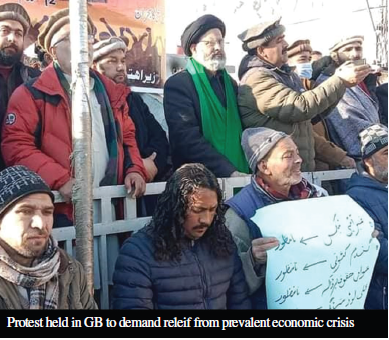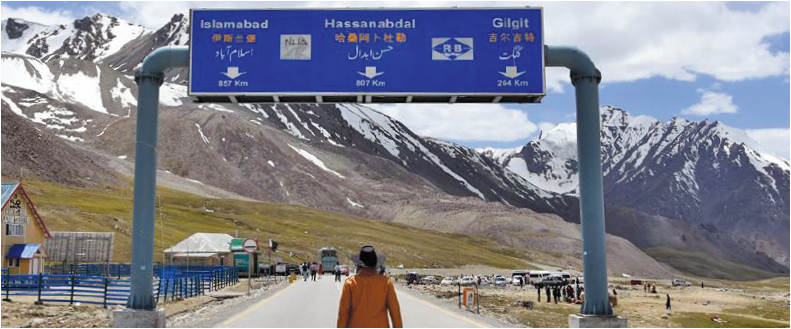Gilgit’s unforgiving mountains carry a forlorn echo. Voices mixed with a crestfallen reminiscing of some romantic notion of utopia.
Gilgit traces her roots to the Dogra dynasty of Kashmir, which ruled over the region of Gilgit-Baltistan from the 1840s until the great independence of 1947.
During this period, the British Empire maintained its administration over the region due to the Great Game between the Russian and British Empire.
The region’s history is marked by many independent small kingdoms, each ruled by a Raja or Mir who held complete sovereignty over the population and the territory, often imposing harsh measures like forced labour without pay and taxation over agricultural produce.
In the early 20th century, the Bolshevik revolution in Russia and the creation of Soviet Union stirred great concern for the British. To protect their northern border and prevent Soviet expansion, the British government of India took direct control of Gilgit in 1935 and obtained a lease of the territory from the Dogra dynasty for 60 years. However, just two weeks before Indian and Pakistani independence in 1947, the British government abruptly cancelled this lease.
On July 30, 1947, the British government transferred the administration of the Gilgit Agency to the government of Jammu and Kashmir, headed by Hari Singh. Singh brought Gilgit under his direct rule and appointed Ghansara Singh as governor. Nevertheless, when Kashmir announced its accession to India on October 27, 1947, the Gilgit Scouts, a paramilitary force raised and equipped by the British, revolted. They
were never favoured accession to India, hence, arresting Governor Ghansara Singh. On November 1, 1947, Gilgit was declared an independent state, acceding to Pakistan after only sixteen days.
This history of Gilgit-Baltistan’s political status highlights the complex web of colonialism, regional autonomy, and geopolitical concerns that shaped the region’s fate. Today, Gilgit-Baltistan remains a semi-autonomous region in Pakistan, with a unique culture and history that continues to shape its identity.
The constitutional status of Gilgit-Baltistan remains unresolved, even after more than 70 years of independence. The region has not been fully integrated into the state of Pakistan, and it is also deprived of representation in the ultimate assembly of the national legislature. The main reason for this anomalous situation is the region’s historical connection to the Kashmir conflict, which has made Gilgit-Baltistan a contested and disputed territory between Pakistan and India.
Gilgit-Baltistan was part of the State of Jammu and Kashmir before independence, which was one of the largest princely states of India. Pakistan and India both claim that Gilgit-Baltistan is part of Kashmir and therefore subject to the Kashmir dispute. Pakistan’s official position has been that only a plebiscite can determine the will of the people of Jammu and Kashmir, and until that plebiscite takes place, Pakistan will continue to administer Azad Jammu and Kashmir (AJK) and Gilgit-Baltistan.
After independence, Pakistan initially brought Gilgit-Baltistan into the administrative structure of its North-West Frontier Province (NWFP), now Khyber Pukhtunkhwa, and governed through it.
The government of Pakistan retained the feudal system of local rajas and mirs and imposed British colonial black law of Frontier Crimes Regulation (FCR), under which a civil servant exercised supreme authority with executive, legislative, and juridical powers. However, the government of Pakistan did not fully integrate Gilgit-Baltistan into the state of Pakistan and instead linked it with the Kashmir issue in anticipation of gaining more votes in United Nations’ plebiscite for the resolution of the Kashmir dispute.
The early years of Pakistani rule in Gilgit-Baltistan were marked by ‘ad hocism’ and a lack of clear and viable policy mechanisms to deal with the region’s unique situation. This lack of planning and continuation of the region’s connection to Kashmir further increased dissatisfaction and grievances of the local population, who felt increasingly marginalised and excluded from the rest of Pakistan. This growing discontent among the local population is one of the major reasons for the current political instability in the region.
The trust deficit between people of Gilgit Baltistan and the state has reached a sharp increase in recent years due to negligence in national politics alongside a persistent under-representation in decision-making at the national level. Apart from this deprivation, Gilgit Baltistan Assembly is confined to legislate on limited subjects whereas Gilgit Baltistan Council chaired by the Prime Minister of Pakistan is empowered to make legislation on certain subjects including natural resources.
Two million voices are currently disconnected from national dialogue and they have no right to vote in electing representatives in parliament. The long waiting deprivation from their legal and constitutional rights despite the promises and commitments of national parties has created frustration and the present political vacuum will create further distrust among people, especially youth.

A season of protests has been arranged by the youth in various districts demanding their constitutional rights and against the illegitimate arbitrary management of keeping the region under control, although people have sworn allegiance to Pakistan unconditionally.
Moreover, Awami Action committee and other movements led by women and social and political activists are calling for provision of basic rights to its people, giving GB rightful status through amendment in Article one of the Constitution of Pakistan.
People are facing challenges in terms of the seizure of natural resources of Gilgit-Baltistan, passage of Gilgit-Baltistan Revenue Authority Act 2022, the implementation of illegal taxes on wheat, electricity, and other daily necessities of life amidst high inflation.
An exasperated experience within a degrading ecosystem, has Gilgitis forced to protest in callously minus temperature. For the past 75 years, the deprivation of constitutionally democratic, and fundamental human rights, a defunct colonial bureaucratic system of governance, and the lack of an independent judiciary and an empowered assembly, have errored the beautiful Gilgit into a gilded prison. Mounting coercion has been increasing the sense of disconnect amongst her people, one only yearns for hope, and not for Gilgit’s hurts to shape her formidable future.
Sajjad Ahmed is Lecturer of Political Science at IBA Karachi.
Jublee Hunzai works as deputy team lead at TDEA-FAFEN.



